How to sleep better in a college dorm, according to experts
As an undergrad, getting enough rest can be tough—but it doesn’t have to be.
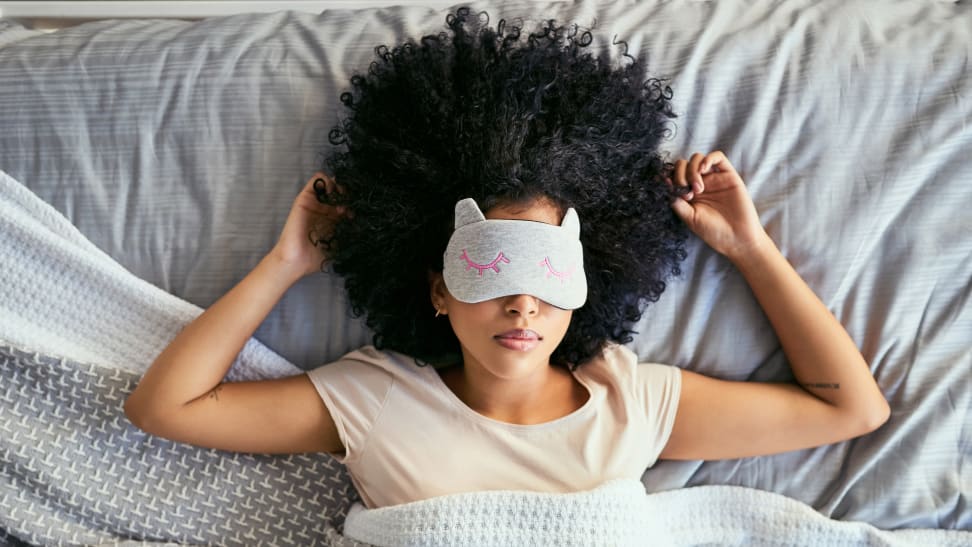 Credit:
LaylaBird / Getty Images
Credit:
LaylaBird / Getty Images
Recommendations are independently chosen by Reviewed's editors. Purchases made through the links below may earn us and our publishing partners a commission. Prices were accurate at the time this article was published but may change over time.
The US has a chronic sleep problem. About 35 percent of Americans don’t get the recommended seven hours of shut-eye a night, according to the CDC, and college students are even worse off, with up to 60 percent reporting poor sleep quality. If you are a college student—or have been one before—this shouldn’t come as a surprise. Sleep is always valuable, but when you are in college, it undergoes a transformation from something you took for granted when your parents helped manage your bed and wake-up times into something more precious, like spun gold or a first-edition Jane Austen novel.
“Living in a dorm can make it challenging to create a healthy sleeping environment,” says Dr. Natalie Dautovich, an assistant professor of psychology at Virginia Commonwealth University and a National Sleep Foundation’s Environmental Scholar. “Noise and light pollution can disrupt even the soundest sleep. Additionally, when living with others, it can be difficult to maintain your own optimal sleep and wake-up schedule.” Add to that the self-imposed sleep disruptions of pulling all-nighters, and you can see why college students in particular struggle to get adequate rest.
But all hope for good sleep is not lost. Here’s how you can maximize your Zs, even in the oft-disruptive clamor of a college dorm.
Make your bed feel like home
The first thing to do upon moving into a dorm is make your bed a place where you want to spend seven to eight hours every night.
Use a mattress topper to soften your sleep surface
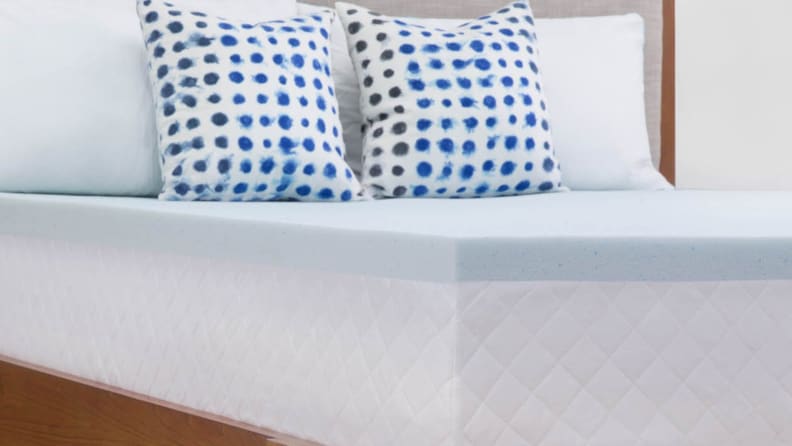
A good mattress topper can make all the difference on a lumpy dorm bed.
Chances are, your RA would frown on you trashing your dorm mattress for something plusher. Enter the mattress topper. You could go with the standby egg-crate foam, or do your back one better with the Linenspa gel-infused memory foam mattress topper. It comes in a twin extra-long size and reviewers say helps cover up errant springs on cheap mattresses.
Get the Linenspa 2’’ Gel-Infused Twin XL Mattress Topper on Amazon for $39.99
Encase your mattress for extra peace of mind
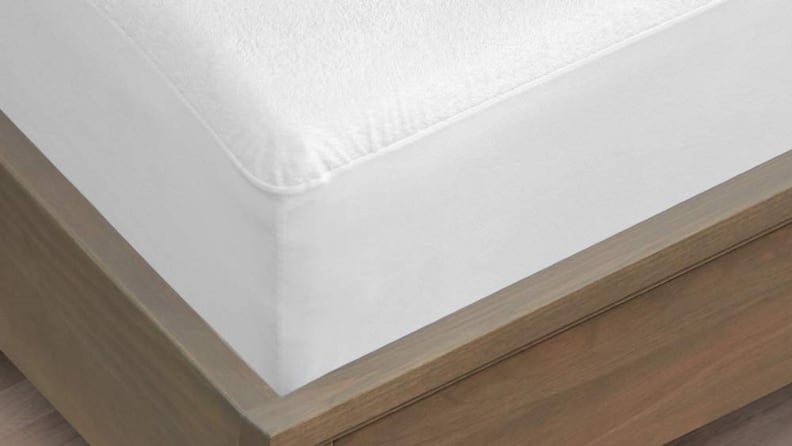
A mattress encasement helps prevent allergies and protect against spills.
You’ll also want a mattress protector, which helps prevent dust mite allergies and moisture from getting into—or coming out of—the mattress. This will improve sleep quality if you happen to be an allergy sufferer, or just help you sleep better at night knowing nothing can leach out of your dorm mattress into the air. “Think of this as your mattress shield,” says Mary Helen Rogers, a representative for the Better Sleep Council. “Encasements are zippered, six-sided items designed to fully separate your bed linens from the mattress. Look for encasements made of breathable fabrics that won’t make noise when you move.”
A good choice is the BareHome Twin XL mattress protector, made of an easy-to-clean cotton material.
Get the BareHome Mattress Protector on Amazon for $19.70
Stack your bed with pillows that work for your sleep style
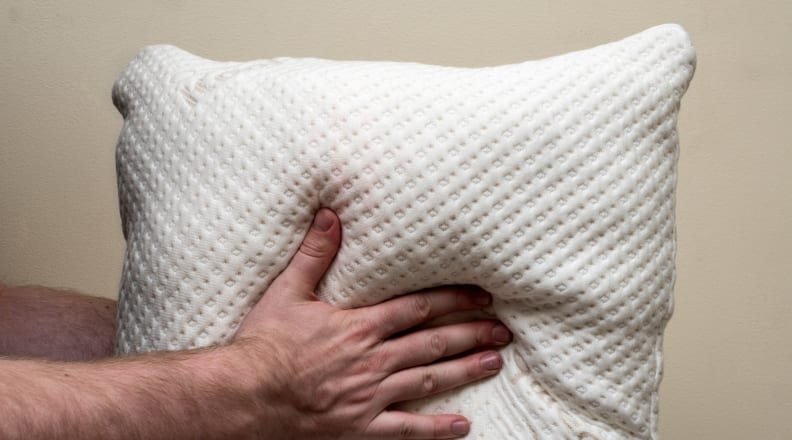
Make sure you're sleeping on a pillow that works best for you.
Next on your bedding list: Finding a pillow that works for you. This depends upon how you sleep—on your back, side, or stomach. “Side sleepers can often use a thicker pillow, stomach sleepers will need a flatter pillow, and back sleepers can use a pillow with medium support,” Dautovich says.
We recommend the Xtreme Comforts memory foam pillow for side sleepers, Sleep Restoration Gel-Filled Pillow for back sleepers, and the Bluewave Bedding ultra slim pillow for stomach sleepers—all are our best budget picks (so you won’t have to choose between investing in a good night’s sleep and next semester’s textbooks).
Get the Sleep Restoration Gel Filled Pillow, best for back sleepers, from Amazon for $33.99 Get the Xtreme Comforts Shredded Memory Foam Pillow, best for side sleepers, on Amazon for $54.99 Get the Bluewave Bedding Ultra Slim Pillow, best for stomach sleepers, from Amazon for $39.95
Layer your covers
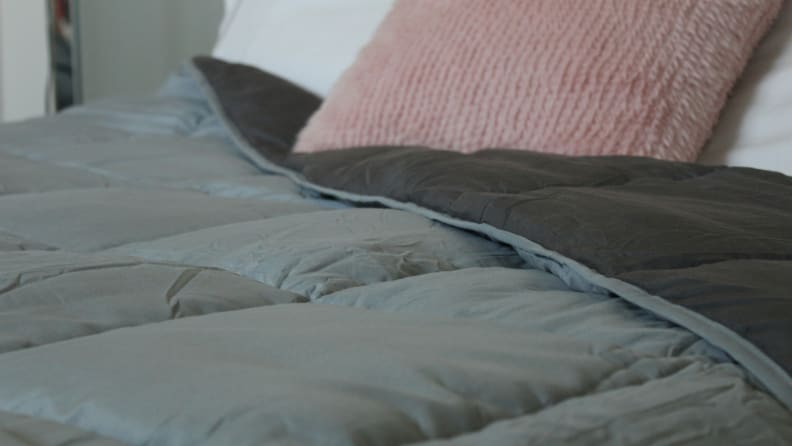
The Linenspa comforter will help keep you cozy without overheating.
Dautovich says it can also be helpful to use a lightweight comforter—we like the Linenspa All-Season Down comforter, our “top value” pick from our comforter tests this year—over a blanket or two and your top sheet. Having more than one layer allows you to make adjustments if your body temperature fluctuates throughout the night. You may even consider a weighted blanket, which some people say helps them fall asleep faster.
Get the Linenspa All-Season Down Comforter on Amazon for $29.99 Get the Gravity Blanket on Amazon for $249
Eliminate as much outside light as possible
Unless you’re coming to college from a big city, your dorm will likely have more outside light than what you’re used to at home—from fluorescent lights in the hallway or a bright, sidewalk-illuminating lamp outside your window. This is something you’ll want to nip in the bud. According to the National Sleep Foundation, artificial light disrupts your body’s instinctive sleeping and waking patterns (also known as the “circadian rhythm”), which is something you’ve noticed on your own if you’ve ever tried to sleep with a bright light in your face.
Block out the light inside your room with a sleep mask

The right eye mask will help you sleep well, even if there's light close by.
If the light usually comes from inside the house (er, dorm)—from your roommate playing video games late into the night, or using a not-so-subtle flashlight to illuminate a textbook study session—you’ll want an eye mask. We like the Nidra Deep Rest eye mask, which has the effect of blackout curtains over your eyes, as well as contoured eyeholes that reduce pressure on the eyes.
Get the Nidra Deep Rest Eye Mask on Amazon for $11.95
Hang up blackout curtains to block light from outside the dorm
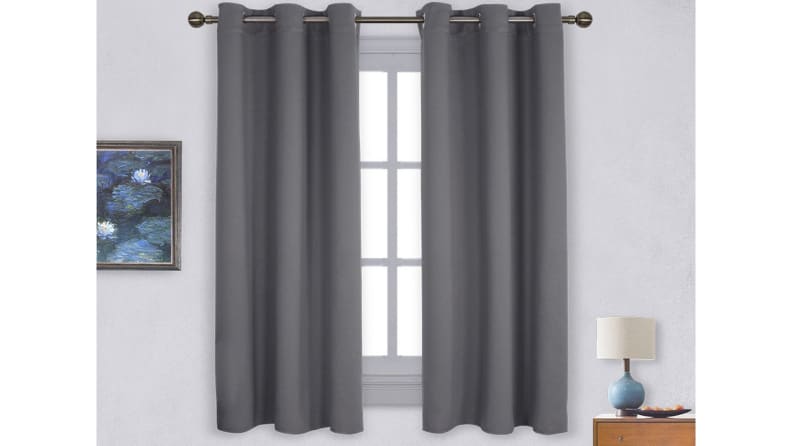
Blackout curtains will help block out light, even on the brightest of days.
For mitigating external light sources, Dautovich says a good set of blackout curtains or blinds is imperative, because they can block street lamps and bright early-morning light (which is essential if you manage to avoid getting 8 AM classes on your schedule—or tend to stay up studying into the night). A set of thermal blackout curtains from the brand Nicetown is a great option. They have over 7,000 reviews on Amazon, in which reviewers praise their ability to obstruct light, soften outside sounds, and maintain the temperature inside a room. That said, in a pinch, a dark blanket or sheet draped from the curtain rod can also do the trick.
Get NICETOWN Insulated Blackout Curtains on Amazon for $21.95
Insulate your door from the hallway
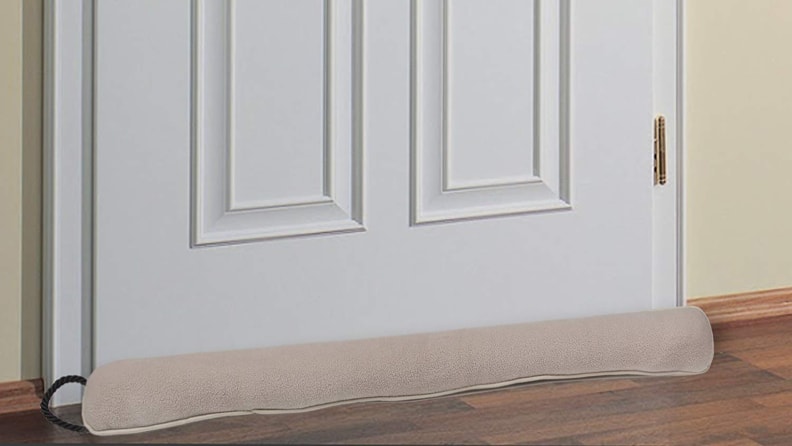
A door sock helps keep out unwanted light, noise, and drafts.
Rogers also recommends a door sock, a cloth or rubber seal that attaches to the bottom of a door to help block light, noise, and drafts. Amazon reviewers love the Home Intuition three-foot draft stopper, which they say helps block light and keep out noise without “curling” or looking dirty after rubbing back and forth on the floor. One reviewer wrote that they bought it to keep bugs outside of their room, and it did the job nicely—hopefully not a problem for you in your dorm, but good to know.
Get the Home Intuition Three-Foot Draft Stopper on Amazon for $12.95
Eliminate disturbances from excess noise
Dorms can get rowdy at any hour. On those occasions when you aren’t participating in the festivities—or you're trying to nap during the day—the “Baby Sleep Sounds” playlist on Spotify may not cut it.
Get the best earplugs for sleeping through anything

Earplugs are a foolproof way to muffle dorm sounds.
For earplugs, we love Hearos Xtreme, which muffle sound without feeling uncomfortable in the ears.
Get Hearos Xtreme Earplugs on Amazon for $7.88
Invest in a sound machine that will help you snooze through the night
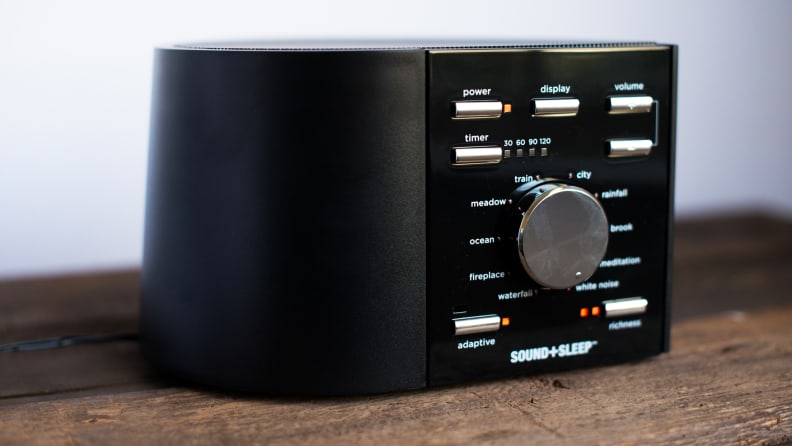
A sound machine can help ensure you nod off as quickly as you can.
Our top pick for a sound machine, the Sound + Sleep by Adaptive Sound, offers a wide range of sound options—such as “ocean” and “thunderstorm”—and a programmable timer, so it won’t drone on into the night after you’ve drifted off.
Get the Sound + Sleep Sound Machine on Amazon for $62.99
Never, ever read your textbooks in bed
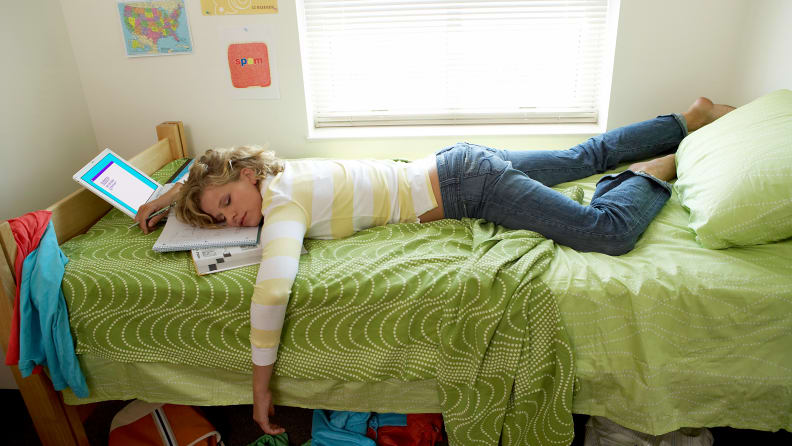
Studying is vital in college, but try not to do it in your bed.
Ideally, you should limit your study sessions to the library or dorm lounge. This isn’t just because it's nice to advantage of the public work spaces at your disposal (though you should, because they’re pretty cool) but because studying in your bedroom—and especially in your bed—can mess with your sleep quality. For optimal rest, your sleep space should be a stress-free sanctuary. Once you start bringing the worries, cares, and assignments from the outside world into it, it can make it more difficult to fall asleep at night. If you must get work done in your room, do it at a desk, not in your bed. “As students live and sleep in their dorm, it is suggested that they create ‘spaces’ in their room,” Rogers says. “A space for study, a space for relaxing, and a space for sleep.”
Depending on the size of your dorm room, that might be easier said than done, but just keep in mind that staying as far away as possible from your bed when studying could make a big difference in how quickly you fall asleep, and how well you stay asleep.
Set a bedtime

Your yawns could be a sign it's time to head to bed.
Working on your sleep hygiene—those everyday habits that contribute to your overall sleep quality each night—could make all the difference between feeling alert throughout the day and always nodding off during Psych 101. “Students that don’t prioritize sleep start the semester off on the wrong foot,” Rogers says. “The lack of sleep will impact their ability to focus and cognitive functions.” One of the best ways to establish good sleep hygiene, according to Rogers, is by scheduling your sleep for set hours of the night, just as you might schedule studying, meetings, and hanging out with friends.
The times you sleep don’t need to be on a traditional schedule—if your first class is at 12 PM, you don’t have to go to bed at 9 PM every night—as long as you keep them relatively consistent and allows for seven or eight hours of sleep every day. “Getting yourself into a routine where you go to bed at the same time and get up at the same time (even on weekends) will lull your body into the habit of regular sleep,” Rogers says. “When it’s bedtime, just go to bed, no matter what. Soon your body will be on board and you will naturally fall asleep and wake up when you are supposed to.”
Get into a pre-sleep routine

Something as simple as brushing your teeth can signal that it's time for bed.
Establishing a consistent pre-bedtime ritual can also make sleeping easier. “Doing the same things every single night signals to your body that sleep is coming and helps your body and mind relax so sleep comes easily,” Rogers says.
Your bedtime routine depends on you and what you like to do, but Rogers suggests taking a shower or washing your face, brushing your teeth, getting in PJs, fluffing up your pillows, and reading a few pages of a book (not a textbook!) before turning off the lights. If possible, put away your phone and computer for the night before you start your routine. (We know. It’s a big ask. Just give it a try.) This gives your eyes a break from blue light emitted from screens, which can disturb sleep.
Nap mindfully

Napping can be helpful, as long as you keep them the right length.
Of course, you might not always make your bedtime. In that case, you can take a nap to make up for it—as long as you’re careful not to let it go on too long. “Napping can help you compensate for missed sleep but be mindful of the timing and duration of your naps,” Dautovich says. “A power nap shorter than 20 minutes will give you an energy boost without feeling lethargic. A longer nap (60 to 90 minutes) can meet some of your sleep need and refresh cognitive functioning. Avoid medium length naps (45 minutes) as you’ll usually wake up feeling groggy.” It’s also best to avoid taking naps in the late afternoon, which can disrupt your usual sleeping routine and make it harder to fall asleep at night.



